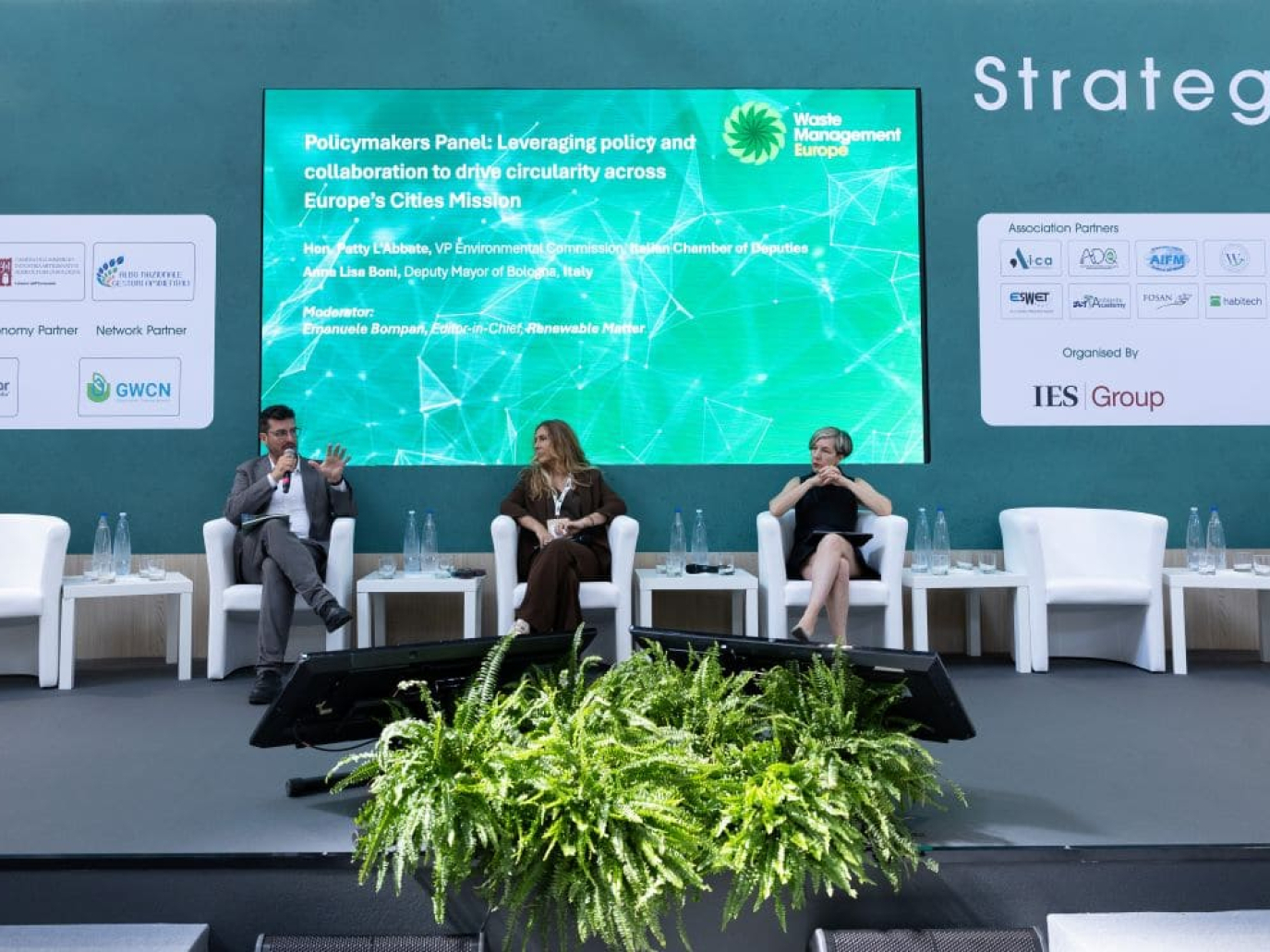Europe is facing increasing pressure from geopolitical instability, climate change and resource constraints, making sustainability not only ethically necessary but economically urgent. The Waste Management Europe conference offers a clear message: to build a truly zero-waste future, the action must begin at the territorial level. This was the central theme at the fourth edition of the event, which concluded on 12 June 2025 in Bologna, gathering entrepreneurs, public institutions, professionals from across Europe and beyond. Materia Rinnovabile reports this edition reaffirmed that circular solutions must be scalable, grounded in local practice, yet ambitious in reach.
One of the opening sessions on 10 June, moderated by Emanuele Bompan (director of Materia Rinnovabile), featured key voices such as deputy Patty L’Abbate. She emphasized that many Italian companies are ahead in the sustainability transition, acting to remain competitive. However, she warned that “there’s need for a cultural change” as public institutions lag behind corporate practice. Anna Lisa Boni, Bologna’s councillor for European funds, ecological transition and international relations, echoed this: Bologna is making major strides toward decarbonization, yet more dialogue is needed since “businesses are more advanced than the public sector”.
Local territories, systemic change
The “go local” theme was central to the conference. Bologna is one of 100 European cities aiming for carbon neutrality by 2030, making it a strategic host for discussing a zero-waste model rooted in local realities. Speakers from Sweden to Ghana shared strategies, demonstrating how waste management, from collection to recycling and reuse, can be re-imagined as part of systemic change. The principle of Extended Producer Responsibility (EPR) recurred as well—one speaker, Vojtech Vosecky, argued it must be fully implemented, since “polluting is too cheap, so sustainability often is not competitive.” He stressed that circular economy is a philosophy, “a way of doing business,” because “everything eventually becomes waste.”
Local governments and enterprises discussed specific tools to improve performance: more effective coordination among municipalities, policies built around resource loops, investment in recycling infrastructure, and legislative support to make circular practices standard rather than exceptional. Italian companies, in particular, see investing in sustainability not only as compliance or ethical imperative, but increasingly as competitive advantage—especially in international markets.
Scalability, innovation and measurable impact
A key outcome of the event was consensus around innovation plus measurement. It’s not enough to adopt circular practices; their results must be measurable, transparent and verifiable. Metrics tied to waste reduction, recycling rate improvements, and environmental impact are necessary to counter rising skepticism associated with the so-called “Esg backlash.” European data support this optimism: according to latest ISTAT figures, companies that invested in sustainability between 2017-2019 grew by 16.7% in the subsequent triennium—a clear signal that sustainable investment pays off.
The conference also underscored the importance of public-private cooperation: enterprises must work closely with local authorities and national governments so that regulation, infrastructure, and finance align with the ambition to achieve zero waste.
The path forward: policy, culture, and scale
Looking ahead, the roadmap emerging from Waste Management Europe includes fostering cultural change, enhancing regulation (particularly EPR), and ensuring that local innovations can scale. Speakers stressed that sectors often treated in silos—waste, governance, public procurement—must be integrated.
For example, in Bologna, local policy leaders described challenges in handling mixed waste, in securing funding for recycling plants, and in involving citizens in reuse and repair schemes. Without systemic change, local efforts risk being undermined by gaps in supply chains, weak enforcement, or low citizen participation.
Waste Management Europe has thus offered more than inspiration: it has laid out a blueprint. To succeed in Europe’s zero-waste ambitions, the shift must be local in implementation, systemic in design, measurable in impact. For many territories, that means new investments, new governance models, and new metrics. But as delegates made clear in Bologna, the tools are available—and so is the opportunity.
Cover: Waste Management Europe



